Best Early Reactions to Death of Henry Kissinger, War Criminal
For once, many speak ill of the dead.
by Greg Mitchell
Reprinted with permission from Greg Mitchell’s newsletter Between Rock and a Hard Place.
Greg Mitchell is the author of a dozen books and director of three films for PBS since 2021. He first wrote about the evils of Kissinger for Crawdaddy more than a half century ago.

Came back from dinner tonight to learn that ogre who has haunted my life for six decades, Henry Kissinger, has finally died. At least Jimmy Carter outlived him, though perhaps a million others he killed around the globe did not. But Christopher Hitchens, wherever he is, no doubt smiling and ordering a round of drinks for everyone. And I can say for the last and perhaps most apt time: Who’s Kissinger now?
No time to write my own anti-obituary, but I have collected some telling early reactions from media and social media. That’s a Steve Brodner classic illustration above. See my recent piece here on Victor Jara, the “Bob Dylan of Chile,” who died in Kissinger-directed coup in Chile.
Rolling Stone headline: “Henry Kissinger, War Criminal Beloved by America’s Ruling Class, Finally Dies.” Huff Post: “The Beltway Butcher: Henry Kissinger Dead at 100.” Mother Jones: “Dead at 100, Henry Kissinger Leaves Behind a Bloody Legacy.”
Al Franken tweeted: “Kissinger called SNL once late on a Friday night looking for tix for his son. The Stones were playing that week. I told him that if it hadn’t been for the Xmas bombing [of Hanoi], he’d have the tickets.”
Several recalled Anthony Bourdain:
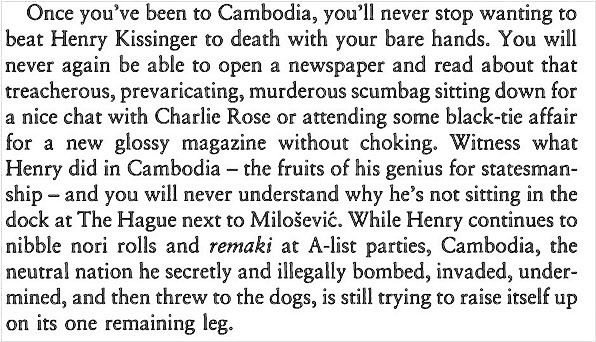
Or Gore Vidal: In the Sistine Chapel, Vidal once came upon Henry Kissinger “gazing thoughtfully” at the Hell section of Michelangelo’s Last Judgment. “Look,” said Vidal to a friend, “he’s apartment hunting.”
Old pal Stevie Van Zandt: “Bon voyage to an historic scumbag mass murderer who forever cheapened the Nobel Peace Prize.”
Sarah Kendzior: “Kissinger was an evil man who brought tremendous pain and death to the world and deserved none of the good things he received in life. He should not be honored. His legacy is that of criminal impunity. Remember his victims instead.”
Charlie Pierce:
200,000 souls in East Timor didn’t get to live to be 100. Numberless Cambodians didn’t, either. You know what you get when a war criminal dies? A dead war criminal. There is going to be a massive amount of insufferable media coverage this week.
Headline at The Intercept: “Henry Kissinger, top U.S. diplomat responsible for millions of deaths, dies at 100.”
Jeff Sharlet: “100 years for Kissinger. 10,000 worthier lives – very few in history weren’t – snuffed out for every one. May they haunt the rotten cheese vapor that was the final condition of his soul. May every pol who paid him court shiver.”
Tim Shorrock: “Le Duc Tho outsmarted the hell out of Kissinger and refused his part of their joint Nobel Peace Prize knowing what a sick fuck the guy was.” Tim also quoted Dylan: “And I’ll stand over your grave ’til I’m sure that you’re dead.” (“Masters of War.”)
Mo Weeks: “Everybody is celebrating Kissinger dying and no one is thinking about the low wage workers forced to build an entire new level of hell at depths never reached before. You guys are so anti-labor.”
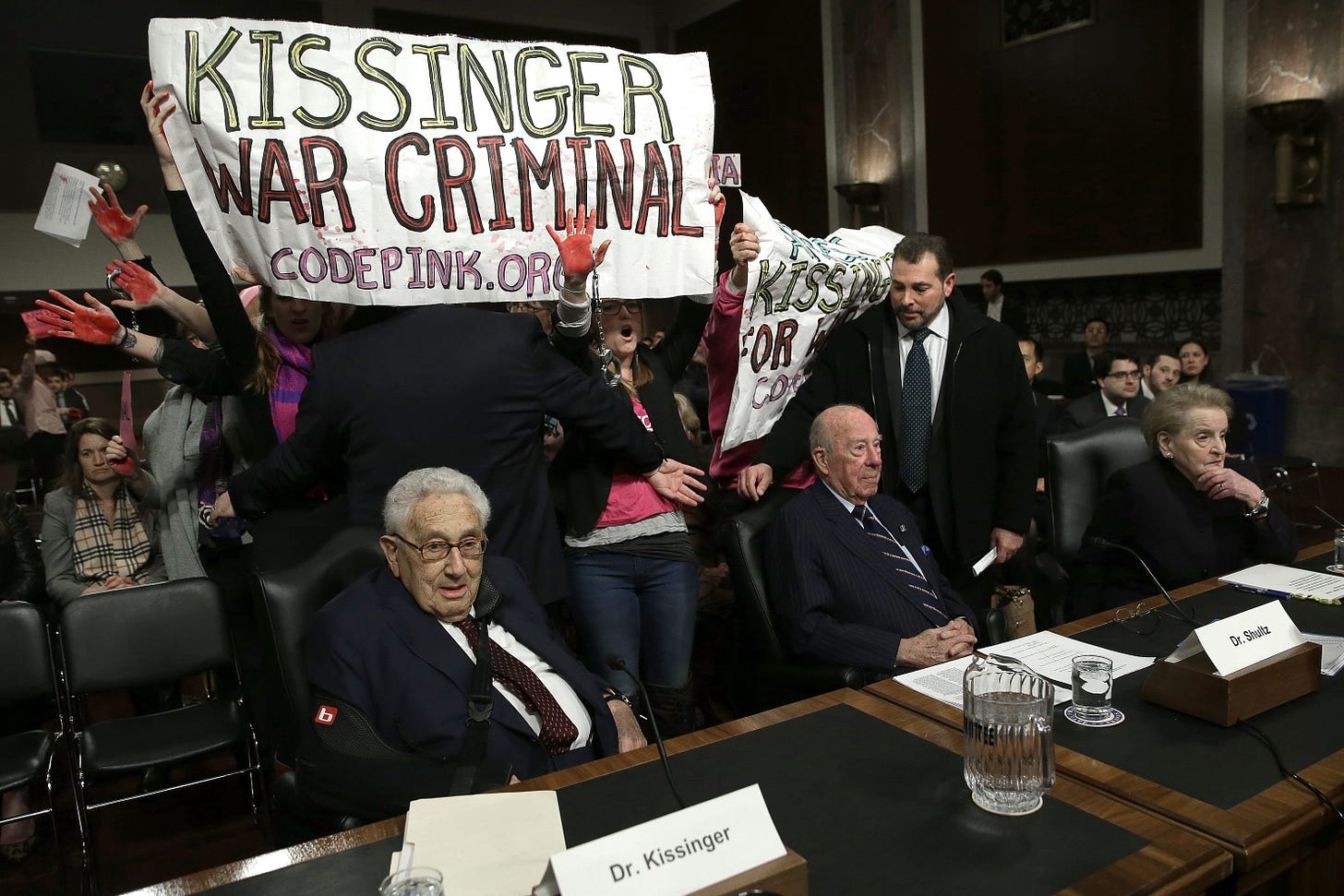
Mark Jacob: “We’ll hear a lot of lies about what an accomplished statesman Henry Kissinger was. He accomplished an illegal war in Southeast Asia. He accomplished a coup that stole democracy from the Chilean people. He was a very bad American.”
Dan Froomkin: “Imagine two types of people: those who would schmooze with Kissinger at a cocktail party, and those who would spit in his eye. The elite Washington media is almost without exception in that first category.”
Alec MacGillis: “The passing of major figures often inspires film choices for the following weekend. Next up: The Killing Fields.”
Cam Smith ordered up an AI illustration and received Kissinger at the Gates of Hell:
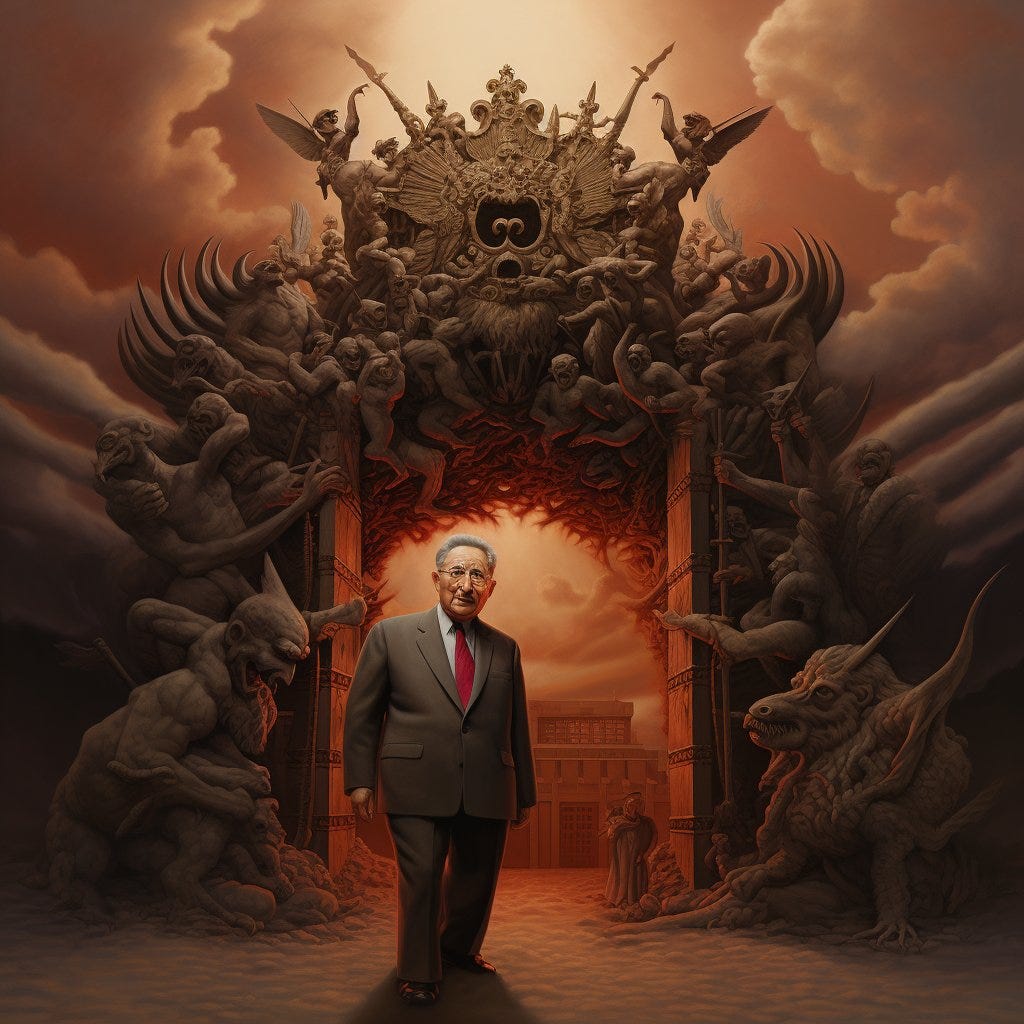
Peter Baker: “The Blood Telegram by Gary Bass is Kissinger at his most Machiavellian, a devastating and disturbing account of how he turned a blind eye to the genocide in Bangladesh to preserve his Pakistani channel to China.” And Bass himself wrote tonight at The Atlantic under headline: “The People Who Didn’t Matter to Henry Kissinger: Lauded for his strategic insights, the former secretary of state is better remembered for his callousness toward the victims of global conflict.”
Kenneth Roth: “With his backing of abusive allies evidently in mind, Henry Kissinger was an adamant opponent of any international criminal justice effort that might have targeted an American such as himself. https://foreignaffairs.com/world/case-universal-jurisdiction Dying at age 100, he was never charged.”
Others found this:
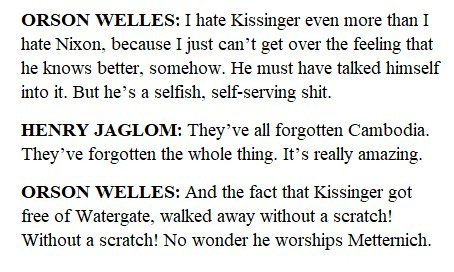
Doug Henwood: “Ding dong…..”
Greg Grandin: “Every year, a significant number of unexploded bombs laying in fields in Laos and Cambodia detonate. In other words, even in death, Kissinger is still killing people.”
Lucian K. Truscott IV: “I sat next to him at an Upper East Side dinner party once in the late 70’s. I felt like I was drowning in a lake of crude oil with a legion of alligators snapping at me.”
The great David Levine called this “Screwing the World” back in 1984.
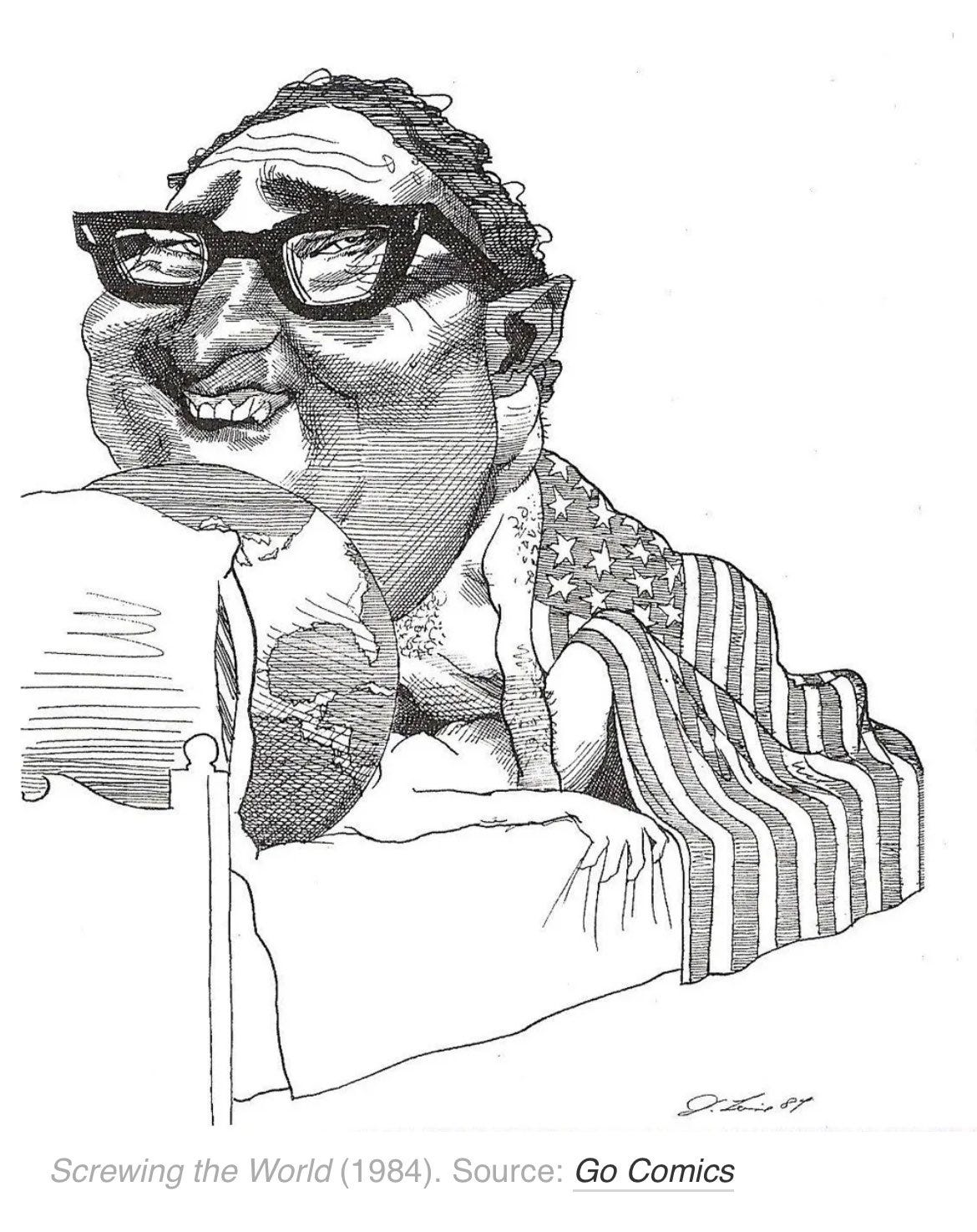
Thanks for reading Between Rock and a Hard Place ! Subscribe for free to receive new posts and support my work.
Greg Mitchell is the author of a dozen books, including “Hiroshima in America,” and the recent award-winning The Beginning or the End: How Hollywood – and America – Learned to Stop Worrying and Love the Bomb, and has directed three documentary films since 2021, including two for PBS (plus award-winning “Atomic Cover-up”). He has written widely about the atomic bomb and atomic bombings, and their aftermath, for over forty years. He writes often at Oppenheimer: From Hiroshima to Hollywood.

0 Comments:
Post a Comment
Subscribe to Post Comments [Atom]
<< Home